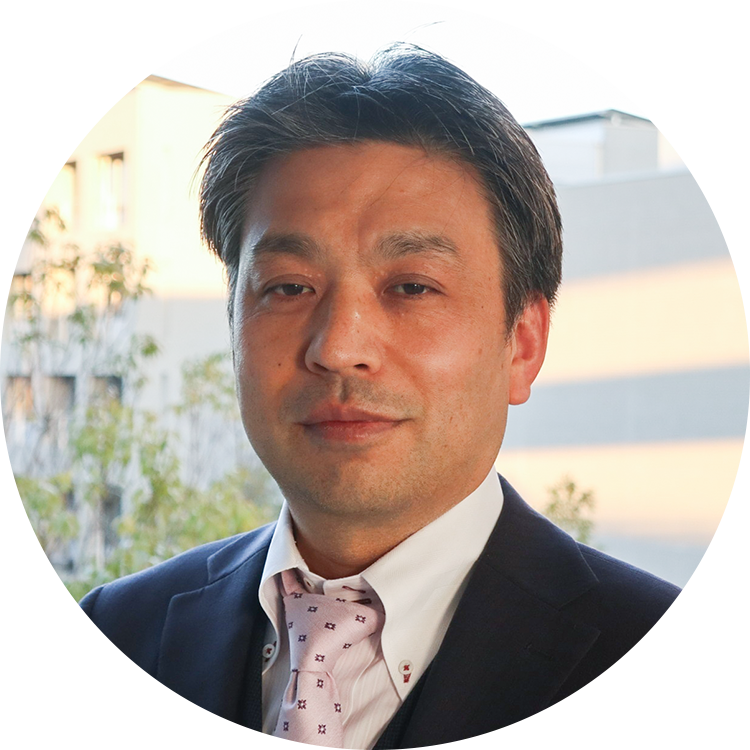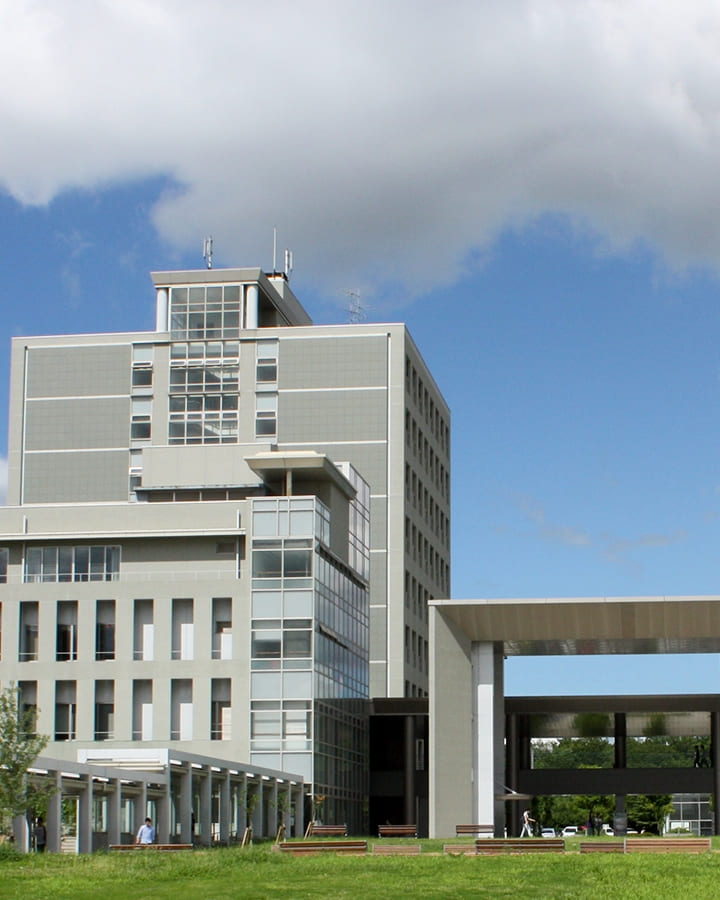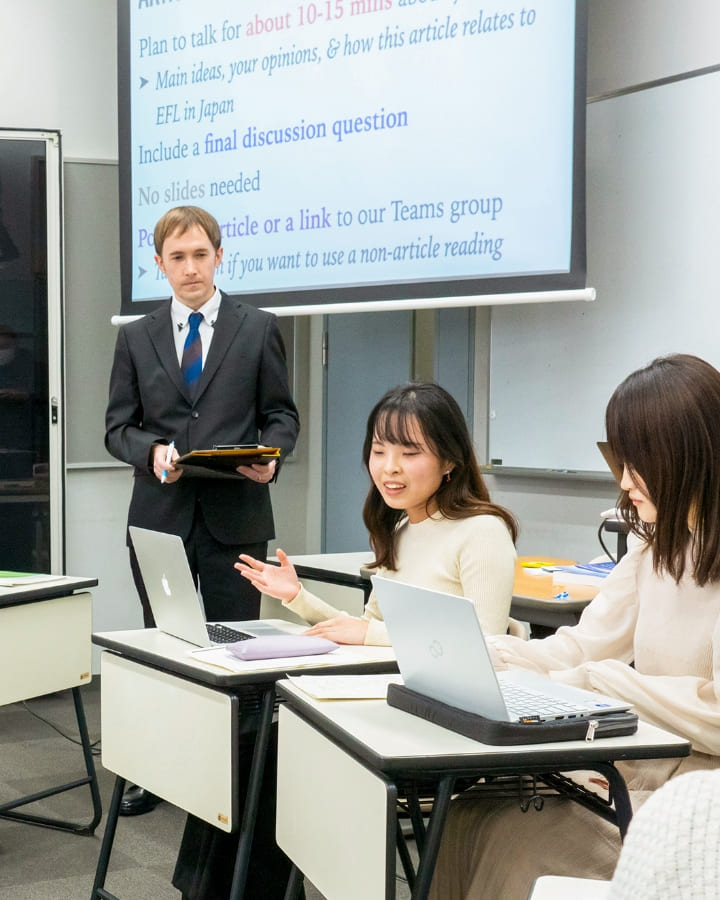
Learning Together, Honing Our Own Learning
- International Cultural Studies Connecting Different Values
The Graduate School of International Cultural Studies of Aichi Prefectural University is a graduate school based on two undergraduate organizations, the Faculty of Foreign Languages and the Faculty of Japanese Culture. The Graduate School consists of two departments: the Department of Intercultural Studies and the Department of Japanese Culture. The Division of International Culture conducts research on foreign languages, cultures, societies, and international society, while the Division of Japanese Culture conducts research on Japanese language and literature, Japanese history, and regional society.
Although the two majors differ in their core research areas, they share a common foundation in the sense that they both contribute to global multiculturalism based on an understanding of one's own culture and other cultures. Another common feature of both majors is that they aim to nurture researchers and professionals through small-group education.
From 2022, the Department of Intercultural Studies established the Community Interpreting Course to train professionals who can provide linguistic support to foreign residents in the fields of medicine, the law, education, administration, and welfare, among others.
Admission policy
Shinji Nakata
Greetings from the Dean
The Graduate School of International Cultural Studies is a very broad graduate school that encompasses various fields of the humanities and social sciences. We hope that the expression "international cultural studies linking different values" will give you a sense of the atmosphere of free and vigorous learning that the Graduate School of International Cultural Studies values.
Unlike graduate schools of science and engineering, where projects are often carried out in laboratories, the humanities and social sciences are based on individual research. For this reason, the graduate school guarantees graduate students a great deal of freedom from the stage of determining their own research themes. They are not bound by the research themes of their laboratory or academic advisor. The flip side of this freedom, however, is that students must be determined and independent enough to accomplish the studies they have chosen. It is never easy to have to prove the value of one's own decisions, and we hope that the process of trial and error will be of positive significance to you and that you will aim for independence as a researcher or a professional.
A major characteristic of this graduate school is that it has a well-developed human system to support the independence of graduate students. The process of learning and discussing together is important in order to relativize the significance of the research you are pursuing and to have it understood by many people. Communication, which is the cornerstone of international cultural studies, is not only communication in various languages, but also a means of connection and exchange between researchers and between researchers and society. Based on this understanding, the Graduate School of Intercultural Studies promotes joint seminars in which faculty members and graduate students from neighboring fields come together, and it has established two specialized courses related to intercultural communication: the Course for Advanced English Proficiency and the Course for Community Interpretation.
We sincerely hope that all of you who have visited this site will enter our graduate school and, as one of our fellow graduate students, study together, refine your own academic skills, and grow significantly.
Educational Policy of the Graduate School of International Cultural Studies
Aiming to develop human resources who can play an active role in international and local communities based on an understanding of their own culture and multiculturalism.
In the Master's Course, the foundation of research common to the Department of International Cultural Studies and the Department of Japanese Studies is considered to be the two specialties of "Language and Culture" and "Sociocultural Studies," and both departments have two additional research fields within each specialty. Specifically, the Department of International Cultural Studies has "Linguistic Studies" and "Literary and Cultural Studies" in the Language and Culture major, and "International Studies" and "Area Studies" in the Social Culture major, while the Department of Japanese Culture has "Linguistic Studies" and "Studies of Literary Thought" in the Language and Culture major, and "Historical and Cultural Studies" and "Area Studies" in the Social Culture major. The second doctoral course includes two courses: "Language Studies" and "Literary and Philosophical Studies.
In the doctoral program, as students progress in their studies and research, they will further deepen the characteristics of interdisciplinary analytical skills in the humanities and social sciences cultivated in the first semester, as well as the ability to develop these skills backed by an international outlook. We also promote research with a multifaceted and diverse perspective that transcends existing academic methods.
Department of International Cultural Studies
The program fosters individuals who are fully equipped with the ability to communicate and handle materials written in foreign languages, and who can accurately respond to various issues in international and local communities.
In addition, the department offers two specialized courses that are designed to meet social demands and focus on specific fields.
The Advanced English Language Specialist Course
This course is designed to cultivate English language professionals whose skills are in demand in society.
The Community Interpreting Studies Course
This course aims to explore community interpreting, which supports communication between professionals and speakers of foreign languages within a wide variety of fields (e.g., healthcare, legal affairs, education, public administration, social welfare), from both theoretical and practical perspectives. Activities related to the course are also introduced on our official Facebook page.
In addition, in 2024, this program was selected as a "Project for the Establishment of Networked Graduate Schools in the Humanities and Social Sciences" by the Japanese Ministry of Education, Culture, Sports, Science and Technology (MEXT). Various learning opportunities will be offered in collaboration with overseas partner graduate schools and domestic partner institutions. Please refer to the project homepage for further details.
See this page for the principal faculty members of the course.
For the final project, which is a requirement for completion of the program, students can choose either a "master's thesis" or "results of research on a specific theme." The latter is evaluated based on policy proposals aimed at solving issues in local communities, development of teaching methods related to language education, translation and commentary of foreign language materials and works of academic value, and excavation and analysis of archaeological and folkloric materials, etc.
Department of Japanese Studies
The Department of Japanese Studies nurtures individuals who are academically aware of global society, and at the same time, who are capable of solving social and cultural problems that arise in Japanese society through a deep exploration of their own culture from an international perspective.
In addition, by offering courses that are common to the Department of International Cultural Studies, we aim to provide students with academic generalities and principles that are not limited to Japan as a regional society. In this way, we aim to deepen Japanese cultural studies qualitatively and comprehensively.





